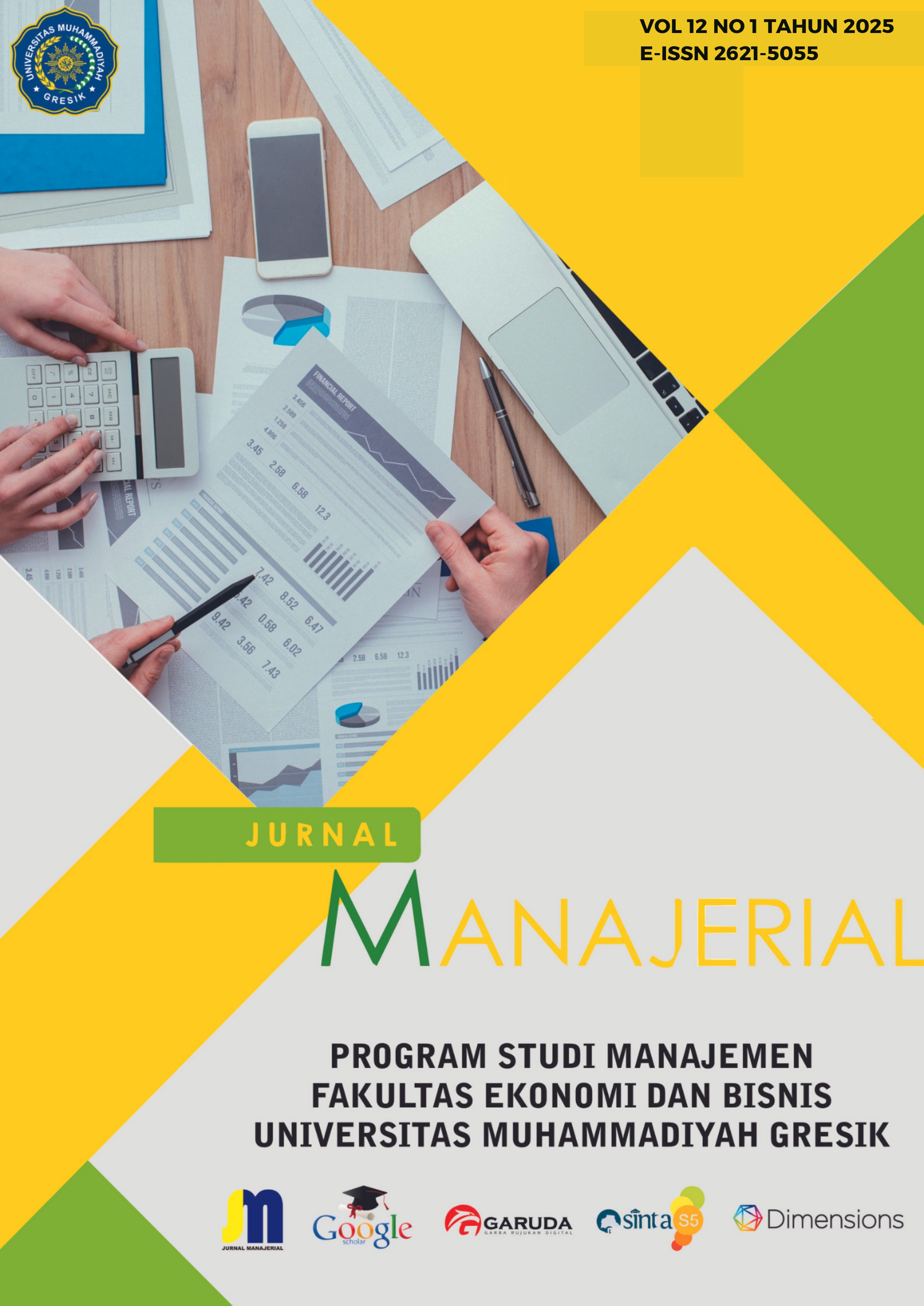Digital Transformation For Sustainable Village Tourism
DOI:
https://doi.org/10.30587/jurnalmanajerial.v12i01.9447Keywords:
smart village, Sustainability, Tourism DigitalizationAbstract
Background - The importance of transforming village tourism towards sustainable digital or smart tourism villages, in the Indonesian context there are still few studies on the topic of digital tourism villages that try to explore approaches to developing tourism villages with their impact and sustainability based on the internet of thought. So that this sustainability is able to make tourist villages good in terms of tourist attraction as well as positive economic, environmental and social impacts for village communities, so that its management can be effective and efficient. The development of digital tourism villages is a development model that provides maximum opportunities for villages and especially tourism to be managed on a knowledge basis.
Aim - The aim of this research is to develop sustainable digital-based village tourism.
Design /Methodology /Approach - This study employs a qualitative research methodology in which informants are interviewed in-depth to gather data.
Findings - The research results show that digital-based village tourism development can increase the competitiveness and welfare of villages without sacrificing the environment. Digitalization makes promotions, online reservations and tourism management easier with data-based technology and artificial intelligence. Smart tourism supports sustainability through waste management, renewable energy and environmentally friendly transportation. Economic opportunities grow with digital literacy for people to develop MSMEs and sell products online. Challenges such as infrastructure and internet access must be overcome through collaboration.
Research Implications - Further research can provide further insight into how digital technology can be utilized optimally to create tourist villages that are more innovative, sustainable and highly competitive.
Research Limitations - This research only explores data from tourism managers, tourism village assistants and information systems academics so it does not involve other stakeholders such as government, visitors and media, as well as the private sector as pillars of the pentahelix.
References
Aliman, N. K., Hashim, S. M., Wahid, S. D. M., & Harudin, S. (2016). Tourists¡ Satisfaction with a Destination: An Investigation on Visitors to Langkawi Island. International Journal of Marketing Studies, 8(3), 173-188.
Aref, F., & Gill, S. S. (2009). Rural tourism development through rural cooperatives. Nature and Science, 7(10), 68-73.
Badran A. (2021), Developing Smart Cities: Regulatory and Policy Implications for the State of Qatar. Int J Public Adm [Internet]. 46(7):519–32. Available from: https://doi.org/10.1080/01900692.2021.2003811
Ballina, F. J. D. L. B. (2022). Smart Concept In Rural Tourism: A Comparison Between Two Phases (2016-2019). Revista de Economia e Sociologia Rural, 60(1), 1–15. https://doi.org/10.1590/1806-9479.2021.234629
Chin, C. H., Thian, S. S. Z., & Lo, M. C. (2017). Community’s experiential knowledge on the development of rural tourism competitive advantage: a study on Kampung Semadang–Borneo Heights, Sarawak. Tourism Review. 72(2), 238-260.
Ella S, Andari RN. (2018), Developing a Smart Village Model for Village Development in Indonesia. Proceeding - 2018 Int Conf ICT Smart Soc Innov Towar Smart Soc Soc 50, ICISS 2018;1–6.
Farhan, H., & Anwar, K. (2016). The tourism development strategy based on rural and local wisdom. Journal of Sustainable Development. 9(3), 170-181.
Guenduez AA, Mergel I. (2022), The role of dynamic managerial capabilities and organizational readiness in smart city transformation. Cities [Internet]. 129(May):103791. Available from: https://doi.org/10.1016/j.cities.2022.103791
Idziak W, Majewski J, Zmyślony P. (2015), Community participation in sustainable rural tourism experience creation: a long-term appraisal and lessons from a thematic villages project in Poland. J Sustain Tour. 23 (8–9):1341–62.
Jingen Liang L and Elliot S (2021) A systematic review of augmented reality tourism research: what is now and what is next? Tourism and Hospitality Research 21(1): 15–30. DOI: 10.1177/1467358420941913.
Klimova TB, Bogomazova IV, Anoprieva EV, et al. (2020) Digital supply chain management in the tourism and hospitality industry: trends and prospects. International Journal of Supply Chain Management 9(3): 843–849.
Lun, L. M., Pechlaner, H., & Volgger, M. (2016). Rural tourism development in mountain regions: Identifying success factors, challenges and potentials. Journal of Quality Assurance in Hospitality & Tourism, 17(4), 389-411.
Marzo-Navarro M, (2015), Pedraja-Iglesias M, Vinzón L. Sustainability indicators of rural tourism from the perspective of the residents. Tour Geogr. 17(4):586–602.
Miles, M. B. and Huberman. (1992), Qualitative Data Analysis, Jakarta, University of Indonesia Publishers, 137-278.
Miller, G., & Torres-delgado, A. (2023). Measuring sustainable tourism : a state of the art review of sustainable tourism indicators. Journal of Sustainable Tourism, 31(7), 1483–1496. https://doi.org/10.1080/09669582.2023.2213859
Mora L, Gerli P, Ardito L, Messeni Petruzzelli A. (2023). Smart city governance from an innovation management perspective: Theoretical framing, review of current practices, and future research agenda. Technovation [Internet]. 123(February):102717. Available from: https://doi.org/10.1016/j.technovation.2023.102717
Mumtaz, A. T., & Karmilah, M. (2022). Digitalisasi Wisata di Desa Wisata. Jurnal Kajian Ruang, 1(1), 1. https://doi.org/10.30659/jkr.v1i1.19790
Nair, V., Munikrishnan, U. T., Rajaratnam, S. D., & King, N. (2015). Redefining rural tourism in Malaysia: A conceptual perspective. Asia Pacific Journal of Tourism Research, 20(3), 314-337.
Okafor L, Khalid U and Gama LEM (2022) Do the size of the tourism sector and level of digitalization affect COVID- 19 economic policy response? Evidence from developed and developing countries. Current Issues in Tourism 26: 1–24. DOI: 10.1080/13683500.2022.2107898.
Pato, L., & Kastenholz, E. (2017). Marketing of rural tourism–a study based on rural tourism lodgings in Portugal. Journal of Place Management and Development. vol. 10, no. 2, pp. 121–139.
Pickel-Chevalier S, Bendesa IKG, Darma Putra IN. (2021) The integrated touristic villages: an Indonesian model of sustainable tourism? Tour Geogr [Internet]. 23(3):623–47. Available from: https://doi.org/10.1080/14616688.2019.1600006
Sari, D. C., Purba, D. W., & Hasibuan, M. S. (2019). Educational Innovation Through Digital Transformation. We Write Foundation.
Sharpley, R. (2007). Flagship attractions and sustainable rural tourism development: The case of the Alnwick Garden, England. Journal of sustainable tourism, 15(2), 125-143.
Sutriadi R. (2018), Defining smart city, smart region, smart village, and technopolis as an innovative concept in indonesia’s urban and regional development themes to reach sustainability. IOP Conf Ser Earth Environ Sci. 202(1):0–12.
Syaodih E. (2018), Smart Village Development. 9th Int Conf Rural Res Plan Gr. 22–33.
Tumbuh 4,95% (yoy) di Q3-2024, Pemerintah Optimis Ekonomi Indonesia Mampu Tumbuh diatas 5% Sepanjang Tahun 2024, Kementerian Koordinator Bidang Perekonomian Republik Indonesia Siaran Pers HM.4.6/393/SET.M.EKON.3/11/2024, https://ekon.go.id/publikasi, Jakarta, 5 November 2024.
Utami, D. D., Dhewanto, W., & Lestari, Y. D. (2023). Rural tourism entrepreneurship success factors for sustainable tourism village: Evidence from Indonesia. Cogent Business & Management, 10(1), 2180845.
Villanueva-álvaro JJ, Mondéjar-Jiménez J, Sáez-Martínez FJ. (2017), Rural tourism: Development, management and sustainability in rural establishments. Sustain.;9(5):1–8.
Vitasurya, V. R. (2016). Local wisdom for sustainable development of rural tourism, case on Kalibiru and Lopati village, province of Yogyakarta Special Region. Procedia-Social and Behavioral Sciences, 216, 97-108.
Zhou, L., Chan, E., & Song, H. (2017). Social capital and entrepreneurial mobility in early-stage tourism development: A case from rural China. Tourism Management, 63, 338-350.






























 P-ISSN: 2354-8592 __ E-ISSN: 2621-5055
P-ISSN: 2354-8592 __ E-ISSN: 2621-5055 
